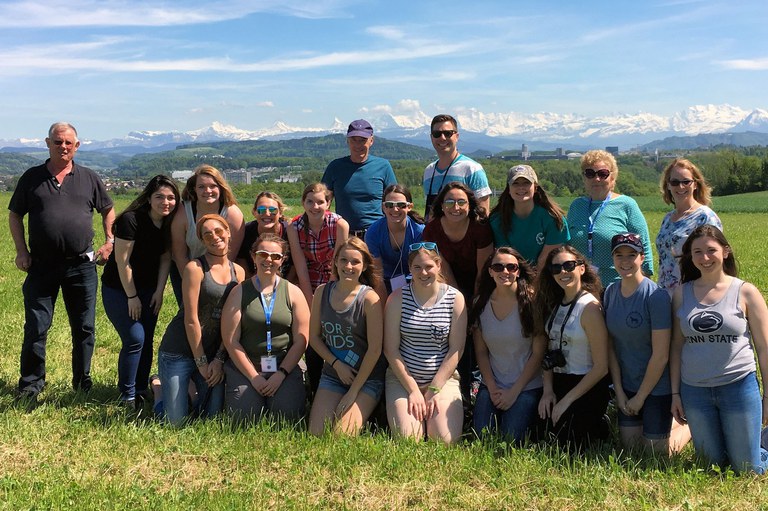Posted: June 13, 2017
Fifteen Penn State students visited Switzerland after studying and analyzing the agricultural sector of the country.

Students and faculty members who traveled to Switzerland for an intensive study of its agriculture, culture, history and people.
The fifteen Penn State Animal Science students who traveled to Switzerland in May had spent the previous semester learning about Swiss agriculture in their Animal Science 499 class. Through research projects, presentations, and lectures, the students explored everything from agriculture in the Swiss Alps to Brown Swiss cattle to the equine industry, all with the purpose of contrasting and analyzing the differences in agriculture between the two countries.
For Abigail Kerr, State College, the intense and thorough introduction to Swiss agriculture, paled in comparison to the learning experience within the country. She said, "No lecture could have made the impact of the astonishing amount of information we learned every day on farms and at local universities. We visited every kind of operation, from a small dairy goat farm to the stunning facilities at Vetsuisse (the Faculty of Veterinary Medicine), and at each one we were presented with an absolute wealth of knowledge and hospitality from those who worked there. Every presenter we had was so eager to share their insight on their corner of Swiss agriculture, it was impossible not to be just as eager to learn it."
Ann Macrina, senior instructor and one of the accompanying instructors from the Department of Animal Science, said course topics ranged from breeding, trade issues, agricultural trade polity, animal welfare to farm management, all intended to culminate in the international educational experience and help students become global citizens. She said, "The 10-day schedule in Switzerland was packed with visits to farms, research institutions and universities, and the learning opportunities were enormous. Our students have all expressed gratitude for the broad scope of the program. They began with a large body of information, but came home from their travels with a much more in-depth perception of the people, culture and agriculture of Switzerland."
The country tour was designed to help students gain a greater appreciation of Swiss culture, history and geography, and included visits to dairy, goat, sheep, poultry, and horse operations; research institutions, cheese factories, chocolate production and wine making facilities. There was also exposure to marketing and career opportunities."
Edienna Pérez, Newark, NJ, said, "It was great to ask questions and engage in discussion with professionals in their respective fields. They were all very informed about their industries and passionate about their careers. The experiences helped us grow both as students and as professionals."
She added, "The high point of the trip was definitely being able to see and spend time around the animals." She also greatly enjoyed the variety of tastings they encountered: cookie, chocolate, cheese and meat.
Kerr found the visit to the "fighting cow" barn one of the most memorial and exhilarating parts of the trip. She said, "The passion the farmers had for their animals was wonderful, and the exhibition of the cows was a great experience." She was also happy to visit the many research facilities and observe firsthand the types of research being conducted, some "quite different from our own."
Part of the wide ranging aspects of the tour was to learn about animal welfare and environmental concerns, both integral to the operations they visited. Students observed the strict adherence to animal welfare laws, and the great respect that is given to agriculture, most of which is on a much smaller scale that in the United States.
Added benefits of the travel included the opportunity to get to know their professors outside the classroom, and to become better acquainted with their fellow students. Pérez said, "The trip definitely allowed us to become closer as a group and share experiences. I learned a lot from people who have completely differently backgrounds and goals from me, and whom I had not known outside the classroom."
She made special mention of the efforts of the two Swiss organizers of the trip: Jürg Blum, who is a retired professor at the Vetsuisse Faculty and an adjunct professor at Penn State in the Department of Animal Science; and Peter Kunz, retired professor at the University of Applied Sciences, School of Agricultural, Forestry and Food Sciences, Zollikofen, Switzerland. Jacob Werner, VMD, Assistant Professor of Veterinary Medicine and Dairy and Animal Science at Penn State, said, "We are indebted to these organizers who made sure every detail of the trip went smoothly and for their encouragement in facilitating dialogue between our students and the various hosts in Switzerland. They helped make the trip truly memorable."
Kerr summed up the experience by saying, "We came home with a greatly expanded view of how agriculture functions in such a tiny country, as well as new friends and laughter, knowledge and experiences to last a lifetime."
Pérez expressed the feelings of many on the trip when we said, "We all left with a little piece of Switzerland in our hearts."
Caption: Penn State students traveling to Switzerland: Kneeling, from left: Alexandra Unis, Abigail Kerr, Rachel Reineke, Rebecca Phillips, Jessie Uline, Anabella Schuman, Liz Melliand,and Scarlett Loya; Middle: Dr. Jürg Blum, Edienna Pérez, Liz Tuorinsky, Casie Walsh, Sarah Haunstein, Shannon Kohler, Isabella Cerrone, Meghan Thomas, Dr. Ann Swinker, and Dr. Ann Macrina; Back: Dr. Peter Kunz and Dr. Jake Werner.

